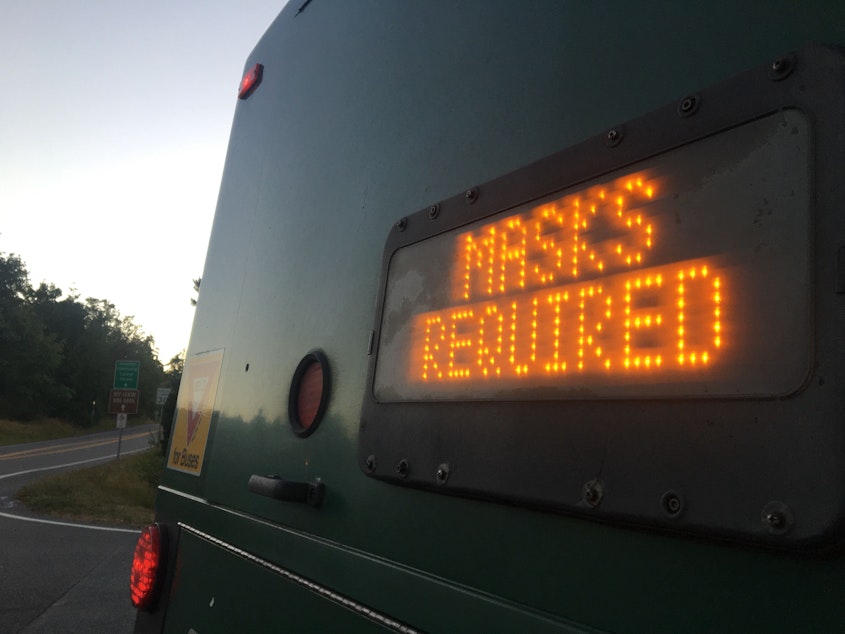Seattle area buses are crowded with essential workers. Drivers feel vulnerable

Metro, the transit agency of King County, is a shell of its former self right now. It’s running at about 85% capacity. Many express routes have shut down, due to lack of commuters.
But other bus lines, especially those serving essential workers, are overcrowded.
That’s left some of the drivers on duty feeling vulnerable.
Eveline Mueller-Graf says if you want to see what’s wrong with Metro’s approach to the pandemic, you could ride on her bus. She drives the number 7 bus route up Seattle’s Rainier Avenue.
“This is a very busy route, and our buses are notoriously overfull,” she said. That’s led to stress for everybody.
Her 40-foot bus is only allowed to carry 12 people right now, due to the coronavirus pandemic, but sometimes more people get on board than the dozen allowed.
Her bus fills up quickly, sometimes with people on their way to work, other times, with homeless riders looking for a warm place to nap.
“I do not blame the homeless population for that,” she said. With libraries and community centers closed, buses are sometimes all that's left for people who are unhoused and needing to warm up.
Sponsored
Drivers are allowed to skip stops, if their buses are full. But drivers still have to pull over if a rider needs to get off the bus. So imagine what happens when a full bus pulls up to a crowded bus stop to let one rider off.
Mueller-Graf described one incident like that. She pulled up, then waved her arms to get their attention and pointed to the sign above her windshield that indicates the bus is full.
People weren't happy, but at least they understand why they're being left at the stop.
"One guy just stood in front of my bus, and he pulled out his cell phone and started filming me,” Mueller-Graf said.
Mueller-Graf kept the front door closed and discreetly opened the backdoor so her passenger could disembark.
Sponsored
But regular riders know the back door is where the action is. A bunch of them scurried down the sidewalk and forced their way in.
After a few stops like that, her bus gets far too crowded, and many of the riders don’t wear masks on the bus, or wear them down on their chin.
She worries for her safety. “We are driving the bus for hours, and sometimes we are for an hour with the same people that don’t have their mask on in the bus, breathing the same air,” she said.
If she says something about masks, sometimes riders cuss and yell at her. But when she does say something, people often come up and thank her later.
Meuller-Graf is grateful for the Plexiglas barriers Metro recently installed to protect drivers.
Sponsored
But she’d like Metro to do more.
For example, she’d like to be able to push a button that would play a clear, simple recording reminding people that they must wear masks, just like drivers can play a recording asking people to move to the back of the bus. Currently, she says there's a rambling message that Metro pipes in on rare occasions.
She wants more reliable access to KN95 masks for drivers and riders, which are better than cloth masks.
And she says Metro needs to find a way to meet demand on busy routes.
These are some of the problems Metro’s General Manager, Terry White, will have to work on in the next coming months.
Sponsored
“I share and understand completely the concerns with mask usage," White said. "I am extremely concerned with our operators as a whole, as they continue to work on this front line trying to help continue to move essential workers."
White has led the agency since this summer, as it struggled with the pandemic. He was just nominated this week to fill the position permanently. Recently, he had his agency install mask dispensers at some of the busiest bus stops. And he says he’ll look into the idea of letting drivers push a button that would play a clear message about masks.
White said his agency figures mask use is at about 80%, which is much higher than Mueller-Graf said she sees on her route. But he acknowledges there's more to be done.
"We are exploring and will continue to explore mask enforcement issues,” he said.
White's bigger project has been getting more buses to run in south Seattle and south King County, where crowded buses are the worst.
Sponsored
Some day, in the next two years, White hopes he'll have the luxury of thinking about the long term future of Metro again. You'll know he's there when public official start talking about a financial package to put before voters, a package that will once again allow Metro to grow along with the economy.
But for now, White said he's asking his managers to look for places to save money, which could mean putting longer term projects to put on hold.
"We need to simplify the playbook," he said. That means getting essential workers from point A to point B in as safe a manner as possible.




